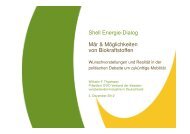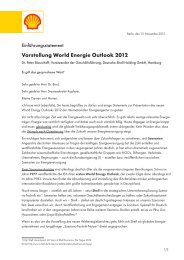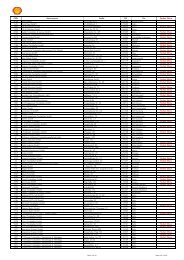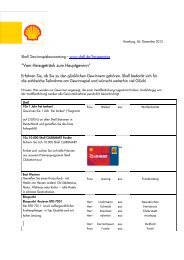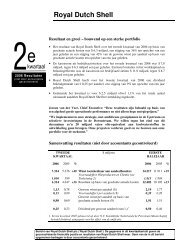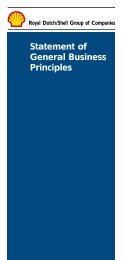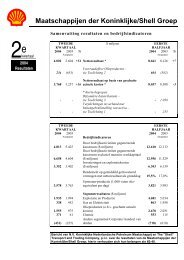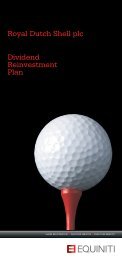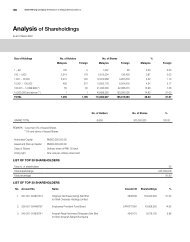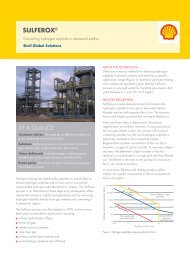62414 sustain 40pp (Mag)
62414 sustain 40pp (Mag)
62414 sustain 40pp (Mag)
Create successful ePaper yourself
Turn your PDF publications into a flip-book with our unique Google optimized e-Paper software.
energy from wind turbines and solar panels –<br />
are allowing us to tap ever-smaller deposits that<br />
were not previously economic (page 13).<br />
More options for transport fuel<br />
Substitutes that can be blended with petrol or<br />
diesel can increase supply options and reduce<br />
dependence on oil in the transport sector. We<br />
are one of the world’s leading distributors of<br />
transport fuel from plants (biofuels – page 15).<br />
Our Gas to Liquids (GTL) technology turns<br />
natural gas into cleaner-burning transport fuel.<br />
We operate one GTL plant in Malaysia and are<br />
building a second, the world’s largest, in Qatar<br />
(see box).<br />
Shell Hydrogen is exploring ways to promote<br />
hydrogen as a longer-term fuel option and in<br />
2006 operated five demonstration refuelling<br />
stations around the world.<br />
More refinery capacity will help avoid<br />
bottlenecks in fuel supplies. Subject to a final<br />
investment decision, construction could begin<br />
in 2007 to more than double production at our<br />
Motiva joint venture refinery in Port Arthur,<br />
Texas. After the expansion, the refinery would<br />
process 600,000 barrels of oil a day, producing<br />
enough petrol to fill up more than one million<br />
cars per day. The project would make Port<br />
Arthur the largest refinery in the USA.<br />
Electricity choices<br />
Shell Renewables is a major developer of wind<br />
power and is investing in next-generation thinfilm<br />
solar technology (page 15).<br />
Our natural gas production provides customers<br />
with an alternative to coal and oil for power<br />
generation. Cooling natural gas to liquid form,<br />
so that it can be cost-effectively shipped long<br />
distances, gives natural gas users a wider choice<br />
of suppliers. We are a leader in LNG (see box).<br />
LNG operations we participate in supply more<br />
than a third of Japan’s and Korea’s total natural<br />
gas needs, as well as customers in Europe,<br />
India, North America and Taiwan.<br />
Shell is also a leader in coal gasification<br />
technology. Turning coal into gas allows<br />
energy-hungry countries like China, India and<br />
the USA, to use their abundant coal reserves<br />
more cleanly and efficiently (page 13).<br />
Additional web content:<br />
• Our efforts to develop new energy technology.<br />
• Shell’s LNG business.<br />
• How we are developing new sources of oil and gas.<br />
www.shell.com/secureenergy<br />
DIVERSIFIED GAS<br />
Today, we participate in operations that<br />
supply more than 35% of the world’s LNG.<br />
Existing facilities in Australia and Nigeria are<br />
being expanded and new projects are under<br />
construction in Qatar and on Sakhalin Island,<br />
Russia (pages 34–35). By 2010, our aim is to<br />
have almost doubled our LNG capacity,<br />
compared to 2004.<br />
Today, diesel containing GTL fuel from our<br />
plant in Malaysia is available in approximately<br />
4,000 Shell retail stations in Europe and<br />
UNCONVENTIONAL OIL<br />
By 2015, 10–15% of our overall oil and gas<br />
production could come from unconventional<br />
sources like oil sands and gas-to-liquids (page<br />
16). We are committed to pursuing their<br />
development in an environmentally and<br />
socially responsible way (page 14).<br />
Canada’s vast oil sands – a mix of tar-like<br />
heavy oil and sand – are thought to contain<br />
as much mineable oil as Saudi Arabia has<br />
conventional. Shell Canada’s Athabasca Oil<br />
Sands Project already produces enough oil to<br />
meet the equivalent of approximately 10% of<br />
Canada’s oil needs. In 2006, the decision was<br />
taken to expand the project’s production by<br />
65%, to 255,000 barrels of oil a day.<br />
Additional oil sands expansions are being<br />
considered that could increase production to<br />
Thailand. The Pearl GTL project in Qatar<br />
will produce natural gas from an offshore<br />
field and use proprietary Shell technology to<br />
turn that gas into transport fuel and other<br />
products. Enough transport fuel will be<br />
produced by the Pearl GTL plant to fill up<br />
more than 265,000 cars a day. Qatar has the<br />
third largest reserves of natural gas after<br />
Russia and Iran. The project will provide an<br />
additional way to bring this gas to energy<br />
users and contribute to reducing dependence<br />
on oil in the transport sector.<br />
more than 500,000 barrels a day. Following a<br />
successful offer to buy out Shell Canada’s<br />
minority shareholders, Shell is proceeding<br />
to acquire the remaining shares, a step that<br />
will strengthen our position in future oil<br />
sands production.<br />
In Colorado, USA, the Shell Unconventional<br />
Resources Energy project (SURE) is testing<br />
technology to produce oil from oil shale.<br />
Heaters lowered into the ground increase the<br />
temperature underground to more than<br />
300ºC to convert the shale into high-quality<br />
light oil – a process that takes millions of years<br />
in nature. The USA Government estimates<br />
that oil shales contain one trillion barrels of oil<br />
in the USA alone – four times Saudi Arabia’s<br />
proven reserves.<br />
THE SHELL SUSTAINABILITY REPORT 2006 9


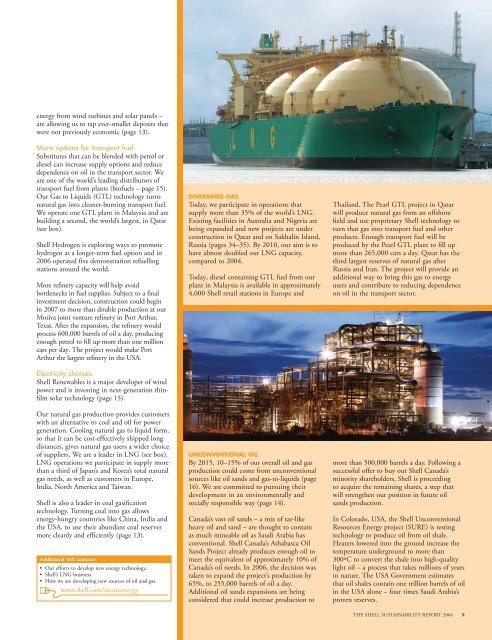
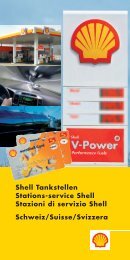
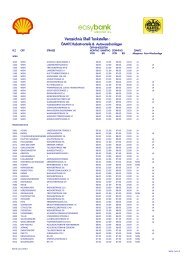
![Download Shell AutoGas Stationen [Stand: Januar 2013] (PDF](https://img.yumpu.com/9982753/1/190x245/download-shell-autogas-stationen-stand-januar-2013-pdf.jpg?quality=85)
